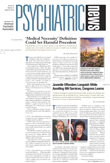For all the heartburn medications advertised on television, one could easily get the impression that America is a nation of stomachs gurgling with acid and producing distress.
There is probably some truth to this image. Some 20 percent to 30 percent of persons living in Western countries are estimated to experience heartburn from time to time, and 20 percent of them at least once a month.
But why do so many people experience heartburn? Psychological stress may be, if not a primary cause, at least a contributory factor. After all, heartburn symptoms have been shown to worsen in response to psychological stress imposed in the laboratory. And now a longitudinal study has evaluated the impact of stressful life events on the symptoms of heartburn. It has found that the presence of a severe, sustained life stressor during the previous six months, rather than more minor stressors during that period, makes heartburn worse.
The study, published in the May/June Psychosomatic Medicine, was headed by Bruce Naliboff, Ph.D., of the CURE Digestive Diseases Research Center at the VA Greater Los Angeles Healthcare System.
Sixty-three subjects with mild to moderate heartburn symptoms were recruited by community advertisement for the study. All subjects had at least a three-month history of heartburn symptoms during two or more days or nights per week. Subjects were evaluated by physical examination, and a medical history was obtained by a gastroenterologist or a nurse practitioner to rule out symptoms suggestive of gastroesophageal reflux complications, gastric disorders, or prior surgery in the upper gut. Other exclusionary criteria included a history of drug abuse or alcoholism during the previous year, use of any drug that might markedly alter gastric motility or gastric acid secretion (except for antacids and H2 blockers) in the month before the study, and regular use of nonsteroidal anti-inflammatory drugs or of any psychiatric medications.
Stressful Events Probed
“The researchers assessed the subjects for stressful life events during the previous six months. These were events that had to do with family, friends, work, finances, or health. Then, during the next four months, the subjects recorded their heartburn-symptom frequency and severity in daily diaries. Also during the next four months, the investigators assessed them for anxiety, depression, and vital exhaustion—identified as fatigue, irritability, demoralization, or “burnout” that can result from chronic stress.
The investigators then attempted to see whether they could find any relationship between the kinds and amounts of stress that subjects had experienced during the six months prior to the study and their heartburn symptoms during the four-month study period. The researchers found that subjects who had experienced a severe, sustained life stressor during the previous six months—say, the death of a spouse, a serious motor vehicle accident in which they were at fault, miscarriage, or divorce—had significantly greater heartburn-symptom severity during the study period than the subjects who had not experienced such a stressor.
Minor Stresses Play No Role
However, minor stresses during the previous six months were not found to play any role in heartburn severity. Also, major stressful events did not predict a greater frequency of heartburn episodes, only greater heartburn-symptom severity.
The researchers also found a strong link between vital exhaustion at the start of the study and the severity of heartburn symptoms, even after controlling for anxiety, depression, and life stressors in subjects.
So, “as with other chronic conditions such as irritable bowel syndrome, heartburn severity appears to be most responsive to major life events and not an accumulation of more minor stressors or fluctuations in mood,” the investigators concluded in their study report. “In addition, vital exhaustion, which may in part result from sustained stress, may represent the psychophysiological symptom complex most closely associated with heartburn exacerbation.”
There are a number of mechanisms that might account for the relationship between a major life stressor and heartburn severity, Naliboff and his colleagues pointed out. Even though most of these mechanisms have been reported in the context of acute studies, they nonetheless could also apply to the impact of chronic major stress on gut physiology. For example, acute stress may increase the level of esophageal acid exposure via gastric acid production or inhibition of gastric emptying of acid. In contrast, the fact that subjects with a history of major stressful events did not report a greater frequency of heartburn episodes, but only greater heartburn-symptom severity, suggests that stress might not alter gut physiology per se, but rather the perception of symptom severity.
An abstract of the study, “The Effect of Life Stress on Symptoms of Heartburn,” is posted online at<www.psychosomaticmedicine.org/cgi/content/abstract/66/3/426>.▪
Psychosom Med 2004 66 426
